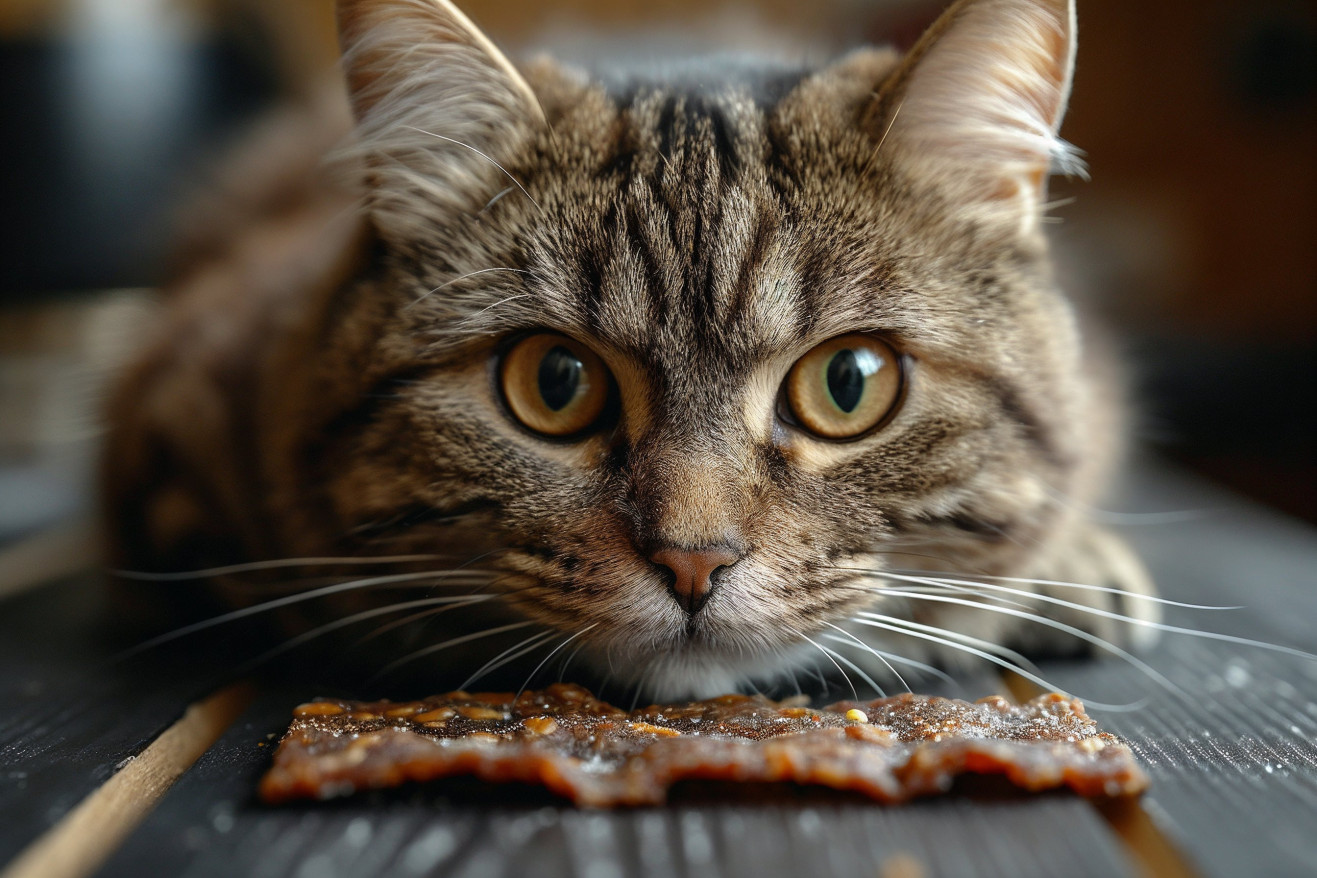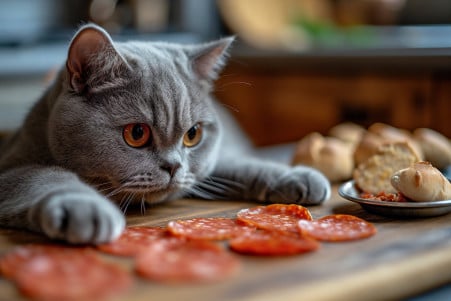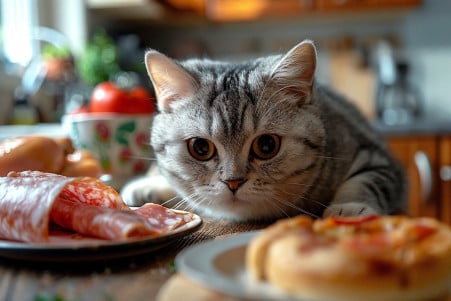Can Cats Eat Beef Jerky? Understanding Feline Dietary Needs
9 February 2024 • Updated 7 February 2024

Beef jerky is a popular snack for people, but can you share it with your cat? While cats can eat beef jerky, it’s not a good idea because it’s high in salt, often seasoned with garlic, and can be a choking hazard. Instead, stick to cat treats that are specifically designed to be nutritionally appropriate and safe for cats.
This article will delve into the science of feline nutritional needs, drawing on information from veterinarians and nutritional studies. We’ll discuss the dangers and concerns associated with feeding cats human snacks like beef jerky, as well as better alternatives that are safe for cats. Drawing on the latest research in animal health and nutrition, this article will help you better understand your cat’s dietary needs.
Can cats eat beef jerky?
Cats Are Obligate Carnivores
Cats are obligate carnivores, which means that their bodies require a diet that is made up of at least 70% animal protein and fat. VCA Animal Hospitals explains that cats have evolved to depend on the specific nutrients found in animal tissue, including essential fatty acids, calcium, vitamin A, and niacin.
Non-meat ingredients are largely devoid of these nutrients, so a diet that is high in animal protein is essential to a cat’s health and well-being.
In addition to animal protein, Cornell University College of Veterinary Medicine notes that a complete and balanced diet for cats needs to contain at least 12 other essential nutrients. These nutrients include vitamins, minerals, fatty acids, and amino acids, all of which are not found in human foods like beef jerky.
In addition, the high levels of sodium in beef jerky can be dangerous for cats, who need much less sodium in their diet than people.
Because of their specific dietary needs, the high sodium content and lack of essential animal-based nutrients in beef jerky make it an inappropriate and potentially dangerous food for cats. It’s important to feed cats food that is formulated to meet their specific nutritional needs.
Health Risks of High Sodium in Cats
While sodium is necessary for a cat’s diet, high levels of sodium can lead to a number of health problems. Research presented at the American College of Veterinary Internal Medicine has shown that high sodium intake can lead to hypertension and kidney disease in cats.
Yet, research cited in Sodium in Feline Nutrition indicates that cats can tolerate diets with up to 740 mg/MJ of metabolizable energy, which is much higher than the level that would be toxic to humans.
However, because beef jerky can have much higher levels of sodium than the recommended upper limit, it does pose a risk. Beef jerky made for human consumption can have a level of sodium that would be toxic to cats if they consumed it regularly.
As a result, cat owners need to be careful to make sure their cats don’t get too much sodium in their diet. The recommended upper limit for sodium has been approved by the EveryCat Health Foundation, so it’s a good guideline for responsible pet owners.
This makes it important to understand the balance that’s needed in a cat’s diet, especially when it comes to human food like beef jerky, which isn’t formulated to meet the nutritional needs of pets. By choosing treats that are made specifically for cats, pet owners can help protect their cats from the risks of high sodium and make sure they’re getting the nutrients they need to stay healthy.
Toxic Additives and Spices in Beef Jerky
The additives and spices used in beef jerky are often toxic to cats. For example, Hill’s Pet explains that onion and garlic are two common ingredients that can cause anemia by damaging red blood cells.
Both onion and garlic are often used to flavor beef jerky, and even small amounts can be toxic to cats, especially when they are in a concentrated form like a powder. If a cat has ingested these toxic substances, they may exhibit symptoms like weakness, lethargy, and pale gums, and they should be taken to the vet immediately.
Dutch.com adds that the herbs and spices used to flavor human foods, including beef jerky, can be harmful to cats. Some of the ingredients to watch out for include chives and other members of the Allium family, which have the same toxic effects as onions and garlic. In addition, the preservatives used in jerky can also be harmful to cats.
If your cat has eaten beef jerky that contains these toxic additives, it’s important to get them to a vet as soon as possible. While the symptoms, which can include gastrointestinal upset and respiratory issues, may not be immediate, the sooner you get your cat to the vet, the better chance you have of preventing more serious complications.
For the safety and well-being of our pets, it’s important to make sure that the treats and snacks we give them don’t contain these dangerous additives.
Healthy, Cat-Safe Alternatives to Beef Jerky
While regular beef jerky is not safe for cats, there are a few healthier options that have been made with cats in mind. For example, The Spruce Pets lists Wellness Kittles, a treat made with a mix of natural ingredients like salmon, peas, and cranberries, as well as omega fatty acids and antioxidants, and no unnecessary additives.
Similarly, Pet Wants’ Real Meat Cat Jerky Treats, which are made with a high percentage of meat and don’t include any added colors, preservatives, or fillers, are more in line with a cat’s carnivorous diet.
When choosing treats for your cat, make sure that they are low in calories, like the Wellness Kittles, which have only 1.1 calories per treat, to avoid causing your cat to gain weight.
Also, make sure that the treats are made with a single protein source, like Whisker Biscuits’ USDA-certified Chicken Jerky, so that they don’t include the seasonings and high sodium content that can be found in human beef jerky.
Not only are these products tasty and stimulating for cats, but they also support their health and natural diet. Make sure to treat your cat responsibly by having these healthier options on hand to supplement their diet and strengthen your bond.
Final Thoughts on Cat Treats
As we have discussed, beef jerky is not a good choice for our feline friends. The high sodium and toxic seasoning content in beef jerky, such as garlic and onion, can be dangerous to cats. In addition, the potential choking hazards and lack of essential nutrients for obligate carnivores in human beef jerky make it a poor choice for our pets.
Good pet parents understand and cater to the specific dietary needs of cats, which is an important part of their overall care. This means feeding them a high-quality, meat-based diet and avoiding foods that could be harmful to them.
We recommend that cat owners look for treats that are made to meet the nutritional needs of their pets. Not only will this keep our cats safe, but it will also help them live their best lives.
We need to be just as mindful and responsible when choosing our cats’ treats as we are when choosing their regular food. Let’s make sure we’re giving them treats that will help them be healthy, happy, and active so they can live long, fulfilling lives as our beloved pets.


